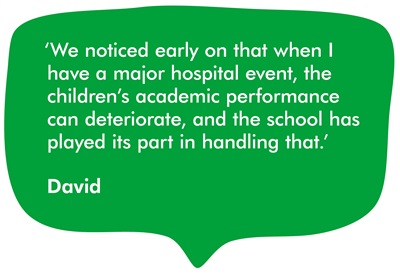This week is Children’s Mental Health Week. In this blog, editor Amy-Louise writes about how children and teenagers may react emotionally to a cancer diagnosis, and how you can help support them.
If you have been diagnosed with cancer, you may worry about the effect that your diagnosis has on those close to you. This includes family and close friends. If you have children, your diagnosis is likely to affect them too. Wanting to protect your children from difficult news and situations is natural, no matter how old they are. They may struggle with difficult feelings and emotions.
Children
Children can have lots of different emotional reactions to your cancer diagnosis. They may worry that you are going to die, that they have caused the cancer or that they might catch it.
Your children may react to your illness with behaviour that you wouldn’t usually accept. This can include feelings of anger or bad behaviour, at school or at home. Some children may struggle with eating or sleeping, or might wet the bed. Here are some tips to help support children:
Teenagers
Teenagers may need more time to work through their feelings if a parent or close family member has been diagnosed with cancer. Being a teenager is a time of emotional ups and downs. They may be facing exams or coursework at school or university, which may add to this stress. This might make them feel lonely and isolated. Here are some tips to support teenagers:

Our booklet Talking to children when an adult has cancer aims to help you talk to children of any age about cancer. It provides useful tips about how to understand children’s reactions, how to help them cope, and deal with changes to family life.
If your cancer diagnosis is terminal, this is a shocking and emotional time. We have a booklet called Preparing a child for loss that is a practical guide to help you begin to have conversations with your children about death.
In some families, teenagers won’t need to do any more than they usually would. In others, they may have more responsibilities to take on. Some teenagers become carers when a family member has cancer. A carer is someone who provides unpaid support to a family member or friend who could not manage without this help. Our booklet A guide for young people looking after someone with cancer has more information for young carers aged 12 to 18.
_______________________________________________________________________________
To see what else Macmillan's cancer information team has been blogging about, please visit our blog home page! You can subscribe to receive our blogs by email or RSS too.
We're with you every step of the way
The Macmillan team is here to help. Our cancer support specialists can answer your questions, offer support, or simply listen if you need a chat. Call us free on 0808 808 00 00.
Comments? Feel free to add them below (you need to be logged in).
Keep in touch Follow Macmillan’s cancer information team on Twitter @mac_cancerinfo
Whatever cancer throws your way, we’re right there with you.
We’re here to provide physical, financial and emotional support.
© Macmillan Cancer Support 2024 © Macmillan Cancer Support, registered charity in England and Wales (261017), Scotland (SC039907) and the Isle of Man (604). Also operating in Northern Ireland. A company limited by guarantee, registered in England and Wales company number 2400969. Isle of Man company number 4694F. Registered office: 89 Albert Embankment, London SE1 7UQ. VAT no: 668265007